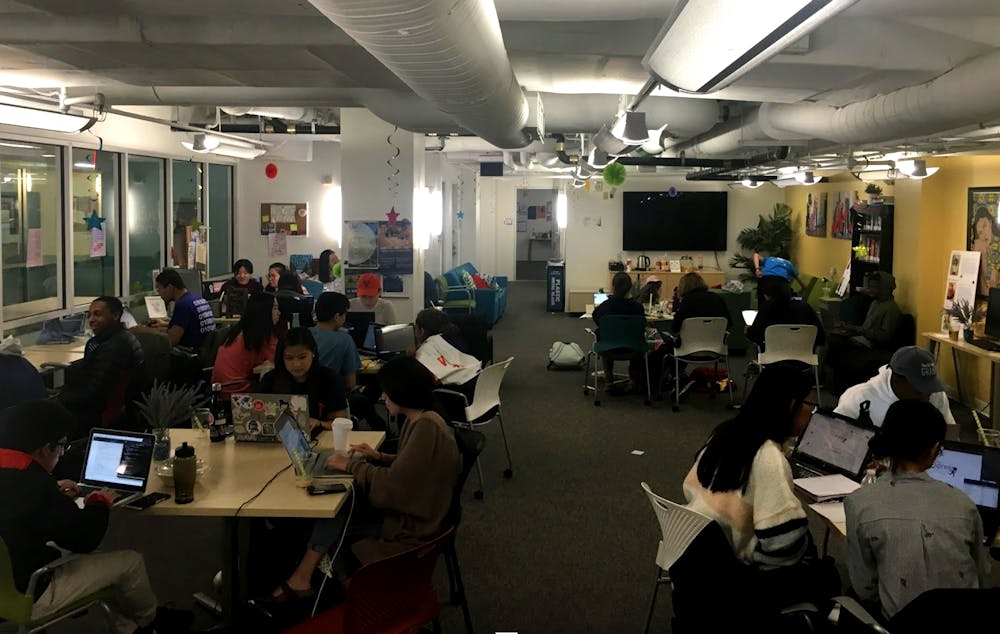The University’s Women in Computing Sciences hosted a 10-hour “Hack to the Future” hackathon Saturday in the lower level of Newcomb Hall. This event was open to all University students and focused especially on attracting first-time hackers.
“The biggest goal [of the hackathon] is to empower people, especially those who are not typically in the tech industry or in [computer science] … and to really give positions to first year students who maybe never held a leadership role or worked on something this big and interact with adults,” said Emily Zou, a third-year College student and hackathon co-chair for WiCS.
The event lasted from the morning until evening, consisting of workshops earlier in the day and giving time for students to work on their projects later on that could win prizes. Gabriella DeFilippo, a second-year College student and hackathon co-chair for WiCS, explains that there were several student-led workshops — such as “Introduction to Data Science” and a cybersecurity workshop — to give opportunities for students to learn about different areas of computer science.
“Our event is more targeted towards people who maybe haven’t been to a hackathon before or are just getting their feet wet with computer science,” DeFilippo said.
The students had an opportunity to win five prizes — Best Overall Hack, Best Design Hack, Best Beginner Hack, Best Runner Up Hack and Best Sustainable Hack. Their projects were judged on five criteria that included impact, innovation, technicality, viability and a “wow” factor. These prizes included Google Home Minis, polaroid cameras, Amazon gift cards and more.
The winner for Best Overall Hack was the project “Sustain-A-Trash”. This project used machine vision to identify pieces of trash by category and then informs the user on which color bin to use for disposal.
Zou explained that a hackathon was a free event for people to build technology-focused projects. The theme of this year’s hackathon was, “We can’t change the past, but we can still save the future. How can we build a better future?” The goal of the projects was to build an application such as a website or an app that adheres to the overall theme.
This year’s projects ranged from websites to apps. First-year Engineering student Aarthee Baskaran explained that her group’s project focused on tracking one’s recycling, trash and composting in order to make people more aware of what they are doing with their waste.
“I don’t have that much coding experience,” Baskaran said. “I just wanted to become more exposed to the different kinds of coding and computer science … and try creating something on my own.”
Third-year Engineering student Nathan Ohene said that his group’s project was focusing on building a vending machine app that allows college students to pick up coffee at any convenient location they choose. Their plan is to enforce students to bring their own cup so that they do not to waste materials, but they will also provide cups at a fee.
“This is my first ever hackathon,” Ohene said. “I wanted to participate in it because I [had] recently gotten a lot more interested in computer science … and I felt it was more oriented to my way of working.”
Third-year College student Ashley Hoang said her group was working on making a cohesive website on all data about off-Grounds housing, including information about locations and prices. They are also trying to making the website more inclusive by creating an option that allows one to see who is living in the apartment.
Throughout the day, students were able to ask mentors from WillowTree and EY for help. For example, Melissa Young, a software engineer from WillowTree, served as a mentor for students. Young’s role was to provide mentorship for students on coding issues, give suggestions about technologies, listen to their ideas and work to address small architectural changes.
Young believes that hackathons are useful since they offer many opportunities for students looking to continue into this field.
“These [hackathons] encourage people to take some time for themselves and work on projects, not just school assignments, and help them look at different technologies,” Young said. “I think is really encouraging and empowering for wanting to continue on in the field later in life.”
Correction: This article previously incorrectly stated that Facilities Management sent a mentor to the event. It has since been updated.







